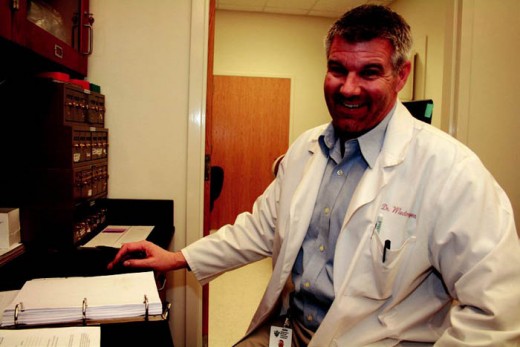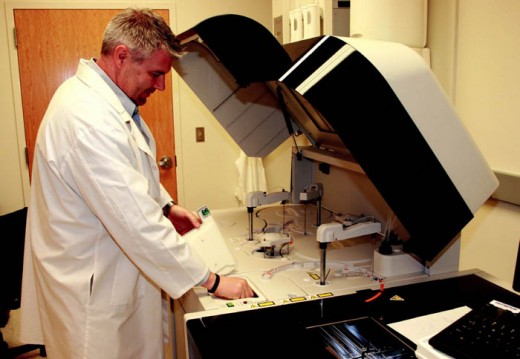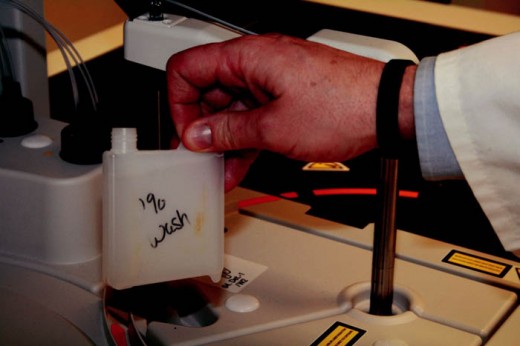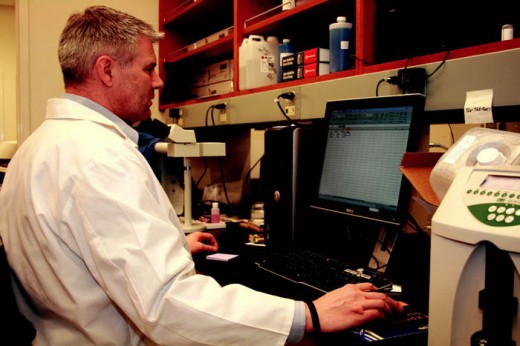Comparative Clinical Pathology Services
Pathologist creates commercial lab at Discovery Ridge
“If not now, when?”
With those words and the air of confidence they convey, Dr. Charles Wiedmeyer entered the world of private enterprise. After much planning and extensive discussions with several people — including his wife, Birgit — the research veterinarian started a commercial pathology laboratory.
Comparative Clinical Pathology Services opened in November 2008 at Discovery Ridge Research Park off U.S. Highway 63.

CCPS is designed for a need Wiedmeyer frequently encountered during his first 15 years in the field. That need came from a variety of sources that generate an increasing demand for research animal pathology services.
From the time he was a young boy in suburban Chicago, Wiedmeyer envisioned a career at small animal veterinary practice. After completing a bachelor’s degree in biology at Southern Illinois University at Carbondale, he went on to earn doctorate degrees in veterinary medicine and veterinary pathology at the University of Illinois. It was in that field that he found his true calling.
“During my graduate studies, I was inspired by one of my professors, Joe Dorner, to devote my energies to veterinary clinical pathology,” Wiedmeyer said.
After completing a residency in clinical pathology at the U of I, Wiedmeyer joined the faculty at the University of Missouri’s College of Veterinary Medicine in 2001.
As a clinical pathology professor, he saw the need for timely, reliable processing of research animal blood samples. Research labs around the country — at such places as pharmaceutical firms, universities, contract research organizations and zoos — all needed pathology services.
So Wiedmeyer started exploring how to start his own commercial pathology laboratory.
“It was in the entrepreneurial spirit advocated by the university that I began to think, ‘Why don’t I do this myself?’” said the enterprising researcher.
By 2007, Wiedmeyer was serious enough about his idea that he took it to Jim Gann, a business counselor at the Small Business and Technology Development Center of MU’s College of Engineering.
“After I described my idea, Jim sort of rolled his eyes as if to say, ‘How are you going to work this out?’” Wiedmeyer said.
During a series of meetings with Gann, the veterinarian and his business counselor discussed the many factors required to start the business such as financing, management and business planning.



To address the business plan, Wiedmeyer secured the talents of five MBA students at MU’s College of Business. Soon the plan was on paper.
Next, he showed it to the president of a bank in Columbia, who was impressed.
However, after lengthy deliberation with his wife, Wiedmeyer decided to bypass a business loan. Instead he chose to take a home equity line of credit on his house. Birgit agreed, with the caveat that if the business went south and they lost their house, “we’ll be moving in with my parents.” (Although he admires his in-laws, the prospect of living with them offered Wiedmeyer extra incentive to succeed in business.)
The entrepreneur employs three lab technicians who process blood, plasma and urine research samples as soon as the shipments arrive at the lab. He pays his techs well in return for prompt, accurate and cost-effective work.
His approach to business is summed up by one simple question: “What is my business doing better than a competitor?” His three answers: “We offer our customers a competitive price. We give them timely service. And I personally offer expert interpretation of the results, which is critical for our customers and their research.”
At this point Wiedmeyer said his venture has arrived at a stage he can handle. CCPS turned a profit its first year and saw a 37 percent increase in revenue the second. The $26,000 line of credit he borrowed in 2008 was paid off in two years, so the Wiedmeyer’s home is safely in their possession.
Because he has income from his primary job as a member of MU’s vet school faculty, Wiedmeyer takes no salary from his business venture. He plows the profits back into the firm to buy vital equipment, such as a recently purchased blood coagulation analyzer.
He and Birgit, who runs her own business as a freelance interpreter and translator and serves as his firm’s bookkeeper, pay the bills on the last day of every month. In addition to the employee paychecks and standard business expenses, they pay the rent to RADIL, the Research Animal Diagnostic Laboratory at MU’s Discovery Ridge Research Park in south Columbia. They also pay RADIL fees for marketing and administrative processing of each sample CCPS analyzes. This symbiotic relationship is beneficial to both parties.
“It’s a good arrangement for our current needs,” Wiedmeyer said. “So far, it’s gone much better than I anticipated. I suppose a lot of the credit goes to the planning and preparation I made before I opened the business. And a lot of that preparation came from my talks with Jim Gann. I value his advice and continue to seek his counsel when questions arise, which happens often.”
For more information: [email protected], www.compclinpath.com
This story was featured in the March 2011 Missouri.net newsletter.


